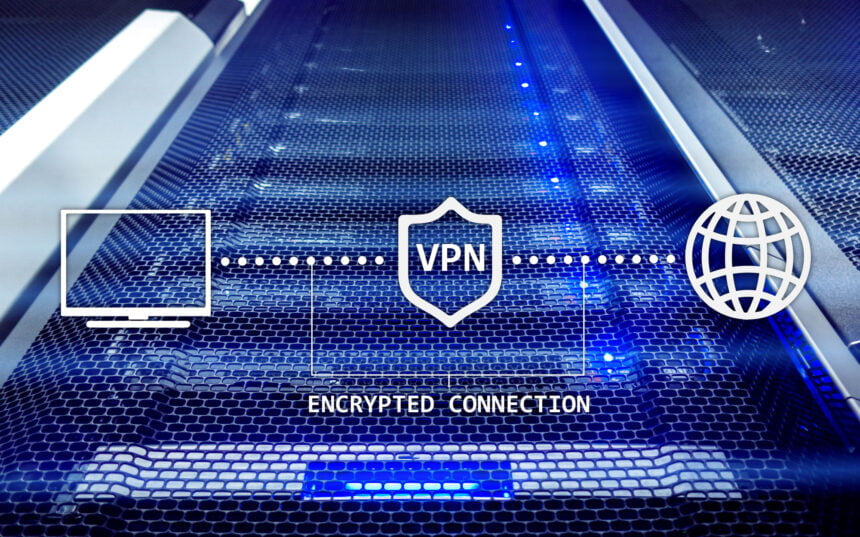Data security has become a paramount concern for most businesses. In the second quarter of 2022, there were over 52 million data breaches.
As a result, companies are doing more to safeguard their data than ever before. They are looking for new data security measures, such as investing in VPNs.
The greatest method for protecting data in transit is a VPN. A virtual Private Network, or VPN, is the solution that encrypts and protects all internet communication between a device and the VPN server. That makes it incredibly difficult for curious hackers to access private information. Given its function, it is not surprising how popular VPNs are for businesses.
VPNs have become even more essential as big data becomes more mainstream. The risks of data breaches are higher as more companies invest in big data, so they have to find new tools to thwart them. VPNs are near the top of the list of data protection tools.
One of the most economical cybersecurity choices available today, VPNs are simple to set up and utilize. Almost all businesses have a corporate VPN as part of their IT infrastructure. Let’s take a look at the VPNs businesses all over the world use and love.
The importance of VPNs for businesses
We have been seeing a serious increase in VPN use in businesses. And this growing tendency is probably going to pick up speed. By 2027, it is predicted that the aggregate value of the consumer and business VPN markets would be a staggering $92.6 billion, barring any unexpected circumstances. There are a couple of reasons behind that.
First off, a user’s computer might appear to be in the workplace thanks to a VPN’s secure connection. There are several consequences to this. Most significantly, it provides a safe way to view and add to data kept on the office server.
Second, this tunnel enables the user’s device’s internet traffic to be routed via it at all times. Longer load times may result from this, but users will be shielded against a variety of cyberattacks.
Remote access VPN
Working remotely is now a perk provided by many businesses and is even necessary for some circumstances. The COVID-19 pandemic made it clear that businesses need to be more adaptable and have the right infrastructure in place since it brought a surge of remote work with it. Remote access VPN can help businesses employ safer and easier remote work policies.
Due to its ability to provide secure connections between remote personnel and enterprise networks, remote access VPNs have seen tremendous growth during the coronavirus epidemic. Data is protected as it travels over the open internet via a remote access VPN, which also employs other security measures like encryption. As a result, hackers and other unauthorized users are less likely to intercept data.
Advantages of remote access VPNs
- Easy remote access: Remote access VPN enables companies to save expenses by confidently hiring remote personnel. The management can unwind and increase the remote workforce since remote access VPN guarantees remote access to the company’s resources.
- Improved data security: The most apparent benefit of remote access VPNs is data security for remote employees. Remote employees can use the VPN to send information without worrying about an attacker intercepting it because data is encrypted when using a remote access VPN. As a consequence, everyone working for the organization can continue conducting business as usual from wherever they are.
- Affordable price: Another advantage is that remote access VPNs provide enterprises with a low-cost choice for protecting the data provided by remote employees. The initial cost is inexpensive if a VPN service provider is selected, and the VPN solution can be easily expanded as a business grows.
- Increased productivity: Even when they are not in the office, employees still need to utilize the services that are only available while connected to the company’s network. Remote employees can access corporate apps and increase productivity while working away from the office by using a remote access VPN.
Disadvantages of remote access VPNs
- Inconsistent performance: Remote access VPNs use the public internet, hence network performance is closely related to that of the public internet. Mission-critical programs and user experience can sometimes suffer from that inconsistency.
- Unstable accessibility: There is no assurance of availability due to inconsistent performance. Public outages that affect remote access VPNs can pause the operations for a short amount of time. If your business relies on remote access VPN solely, this might cause a problem.
Site to site VPN
With a site to site VPN, employees can safely access resources from a remote location. This might sound similar to remote access VPN, but the difference is this: a remote access VPN links users to a remote server to access a private network. A site to site VPN, on the other hand, enables users in various places to access one another’s resources.
A site to site VPN service links users throughout the whole network who are located in various places. Users of this network can share data while keeping it encrypted and safe using a VPN from the comfort of their own locations. This way, users working in different offices can still communicate with one another and use all of their corporate resources. This secures the information sent between users while keeping all users connected, even while they are working remotely.
Advantages of site to site VPN
- Heightened security: A site to site VPN creates a safe link between two networks. It is therefore perfect for companies that want to link together different corporate offices.
- Cost-effective solution: By utilizing a VPN, you can avoid paying expensive licensing fees or monthly costs. A VPN eliminates the need for such capabilities by effectively making you invisible online. Since they’ll believe your system is located thousands of miles away, you do not need to prevent others who attempt to access your network.
- Simpler network architecture: A site to site VPN can be used by businesses with complicated network architectures to make it simpler by allowing traffic to be routed between different local area networks. It also enables users to easily access the company’s resources from anywhere.
Disadvantages of site to site VPN
- Limited compatibility: Some site to site VPN configurations might not function with all kinds of devices and networks. This can require your business to do some arrangements to make sure that all your employees are using a site to site VPN.
- Less mobility: site to site VPNs are by definition static and can only connect two remote destinations. For instance, you are unable to create a secure tunnel from any location where you are connected to Wi-Fi like you can with a remote access VPN. Instead, only two certain networks can transfer encrypted communication to each other.
VPNs Are Invaluable for Companies in an Age Dictated by Big Data
Big data has made the risk of data breaches higher than ever. As a result, companies need to use new solutions to prevent data breaches.
As a highly evolved technology, VPNs started off as a way for IT specialists to connect several office sites over the internet and offer secure remote access. We now see so many businesses employing a VPN service on a daily basis, and the reasons behind that are clear. There are a number of VPN types businesses use, two of which are mentioned above. Make sure to make a thorough research before settling on a VPN type for your company as VPNs are not one size fits all solutions.











